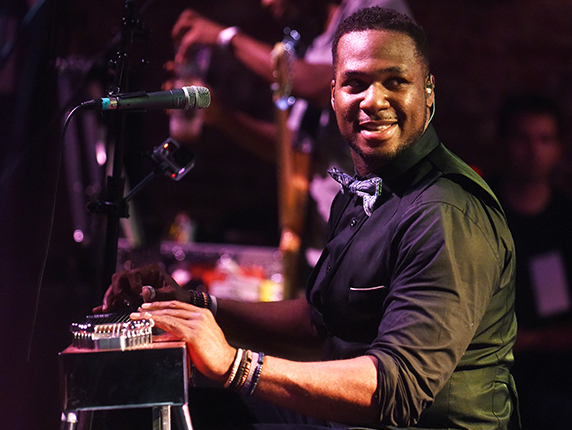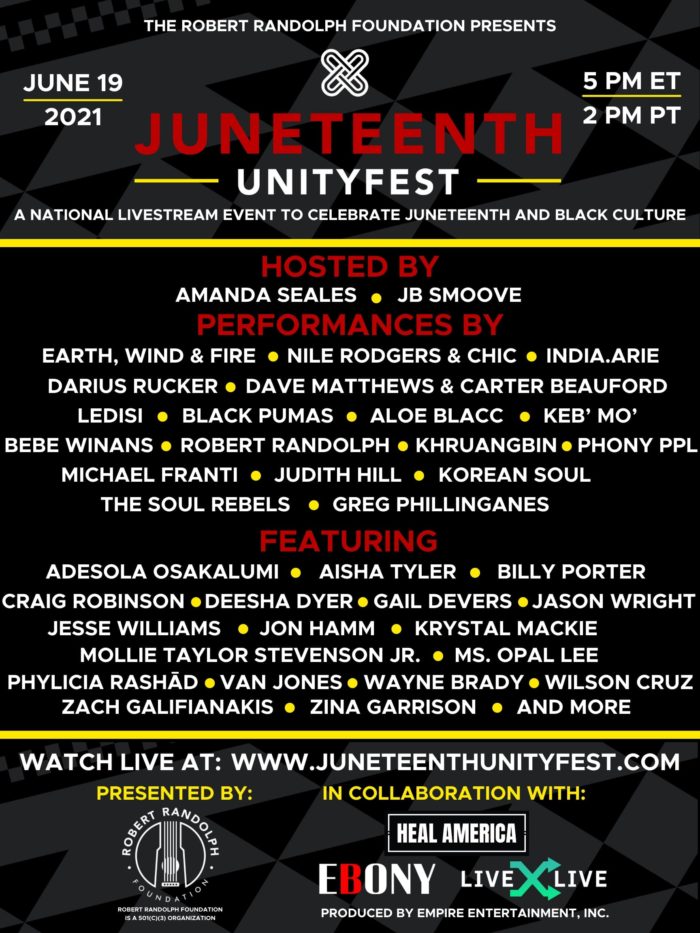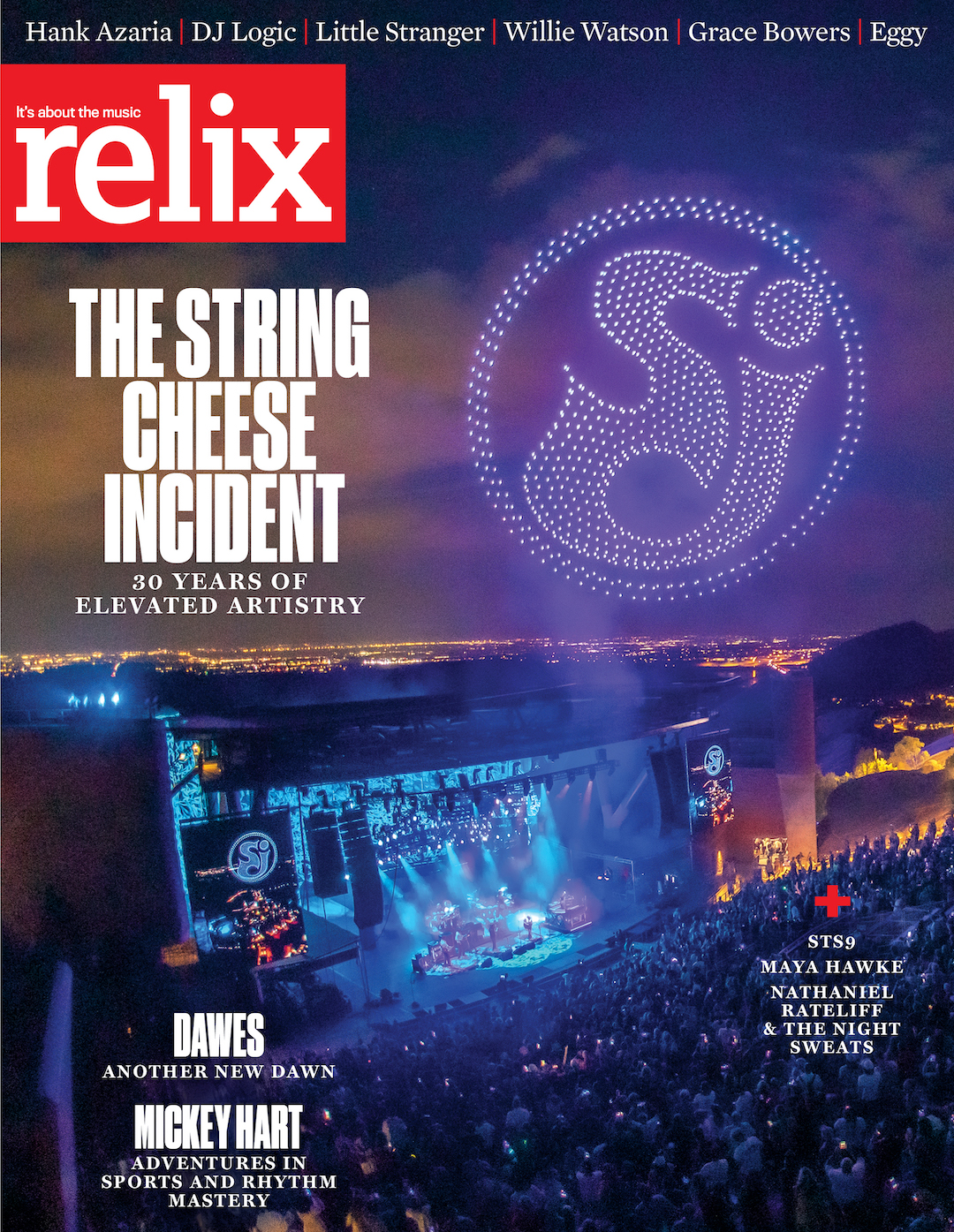“Black History is American History”: Robert Randolph on Launching Juneteenth Unityfest

photo credit: Dino Perrucci
“It’s all about love, peace, respect, honor, and unity,” Robert Randolph explains, as he describes what prompted him to create Juneteenth Unityfest, an extraordinary virtual event that will stream this Saturday, June 19 beginning at 5:00pm EDT. The Robert Randolph Foundation is presenting Juneteenth Unityfest, which will not only explore the holiday of Juneteenth but also Black cultural experience in America, with a particular focus on some of the charitable and grassroots organizations that promote betterment and harmony.
The inaugural version of Juneteenth Unityfest will have an additional celebratory tenor because on Thursday, June 17, President Biden signed legislation designating Juneteenth as a national holiday. Upon signing the Juneteenth National Independence Day Act, Biden acknowledged the decades-long efforts of 94-year-old activist Opal Lee to advance this goal. Lee will be a cherished participant in Juneteenth Unityfest.
Juneteenth originated as a Texas holiday, commemorating June 19, 1865, the day on which the Union Army’s Major General Gordon Granger announced General Order No. 3 declaring, “The people of Texas are informed that, in accordance with a proclamation from the Executive of the United States, all slaves are free.”
Two and a half years earlier, on January 1, 1863 President Lincoln had issued the Emancipation Proclamation but that only applied to “enslaved people in the states currently engaged in rebellion against the Union,” limiting its reach to slaves under Confederacy rule because President Lincoln did not believe that he had the right to issue a general declaration of freedom without a Constitutional amendment (which the states did finally ratify as the Thirteenth Amendment, on December 6, 1865, nearly eight months after Lincoln’s assassination).
Granger’s announcement of General Order No. 3 on June 19, 1865 resulted in the immediate manumission of over 250,000 slaves in the state of Texas, who initiated their first celebration of the event a year later.
Amanda Seales and JB Smoove will host Juneteenth Unityfest, which will offer insight and reflections on the range and scope of Black history. The program also will include musical performances by artists such as: Earth, Wind & Fire, Nile Rodgers & CHIC, Darius Rucker, India Arie, Ledisi, Dave Matthews & Carter Beauford, Black Pumas, Keb’ Mo’, Bebe Winans, Khruangbin, Michael Franti, The Soul Rebels, and many others, including the event’s founder, Robert Randolph. This past Tuesday afternoon, Randolph took some time to reflect on Juneteenth Unityfest (at a moment prior to passage of the Juneteenth National Independence Day Act).
Before we talk about Juneteenth Unityfest, we’re approaching the 20th anniversary of the night you recorded Live at the Wetlands (8/23/01). What are your memories of the club and that evening in particular?
Playing the Wetlands was great. Man that was a long time ago. Now people look back at it as a historical venue where everybody played. I remember there would be two or three bands, sometimes four, and it could go all night long. That’s how I sort of got my beginning, coming from the church and entering that scene, not really knowing what to expect but making a lot of friends. I remember we had to go on early a lot of times because my drummer, my cousin Marcus, wasn’t old enough to actually be in there at the time. [Laughs.]
So that’s kind of how we got started and there was such a great vibe. The Wetlands always sounded great too, which is why we decided to make a live record in there. People are still discovering us through that record. It really had an impact. That’s how Eric Clapton discovered us. That’s how Dave Matthews Band discovered us and so many others as well.
I listened to it again last week and I was reminded that Relix publisher Peter Shapiro introduces the band.
Pete and I always had that connection. Like you said, it’s the 20th anniversary and it’s wild hearing him on it. At first we weren’t going to have him on there but he did such a great intro and it just seemed cool, so we left it on there.
So there’s the voice of Pete Shapiro, the now iconic venue owner and promoter. I mean, it’s just crazy because Pete has become sort of a big brother and uncle to some of these younger bands with his venues and his vision of what music is and how to get a loyal audience. It’s kind of astounding. He’s been the guy that’s supported and really uplifted the careers of so many artists and kept them going. He’s always been a guy who doesn’t care if you have a hit song—that’s not how he looks at things. He’ll still invite you to come and play the Capitol Theatre or Brooklyn Bowl or all these different places and it’ll be a great experience. It always has been that way in any of his venues. So I take my hat off to him personally. He’s such an innovative guy.
When you came out of the church and started playing Wetlands did you have any sense of what your career trajectory might be?
I never really had a goal like that. I was coming from the church and when we recorded that record, I was still working at a law firm in New Jersey. I had just turned 21 at the time when we recorded that record and then it came out. We released it through SCI Fidelity which was String Cheese, Mike Luba, Kevin Morris and all those guys.
That was our whole start and I remember six months later I told the people at my job where I had been working at since I was 18, “Hey, I’m going out to go play music.” They were like, “What? We didn’t even know you played music.” I was like, “Yeah, that’s what I’ve been doing every night after work, then coming back in here tired every morning.” [Laughs.]
You mentioned the idea of uplift which certainly leads me to the Juneteenth Unityfest. But before we talk about the event, can you talk about a little bit about the Robert Randolph Foundation. What are its origins and where do you hope to take it?
I started the Robert Randolph Foundation with the goal of providing advanced educational opportunities. We’re focused on creating empowered communities but doing it through a grassroots approach by engaging communities in education. We’ve got a new Create the Future program that we hope will equip people for whatever happens after they finish high school. We want to provide experience and leadership opportunities for them. This career readiness curriculum utilizes a wide range of skill-building tools and I’m hoping to put these young people alongside industry and business mentors as well.
Is there a direct correlation to the Juneteenth event?
Since we have a focus on education I really wanted to dive into what Juneteenth was, because there are many Americans who don’t know the full history and historical context of Juneteenth. That includes what happened after slavery—where did people go after that?
This is coming off of last year when the whole world sat on their couches and on their phones and watched the murder of George Floyd. Many people thought something like that had never happened before, but unfortunately, growing up as a Black person in America, myself, we’ve seen that thousands of times. However, in response, as my grandmother said, she never thought she would see the day when there would be hundreds of millions of people around the world, marching for a better future, to end racial injustice, to let everyone know that enough is enough.
So going from that into Juneteenth, people started to research and learn what it was and began to talk about it. That’s when I had this vision to educate people on what Juneteenth was, so that they would understand the significance of it being the end of slavery down in Texas and all of these stories that came out of that.
When it comes to Black history, people are often taught about slavery, then Rosa Parks, Dr. King and Obama. Then in between there are athletes. But Ms. Opal Lee has been working for the better part of the last 30 years to get Juneteenth to be properly recognized as a national holiday.
So I stepped up and said, this is a way to bring the country together, bring all Black Americans together, to tell our stories and have the world be engaged in these stories that have never been told while also celebrating all of these accomplishments that have been overlooked.
Myself and our whole team who formed the Juneteenth Unityfest have learned so much diving in deep in the history. We’ve invited all of these incredible, community organizations, grassroots organizations and museums to be part of it, like the Africa Center, the Hip Hop Caucus, the Black Cowboy Museum down in Texas, the Smithsonian Museum of African American History and Culture and over 50 community organizations, so we can tell these stories and celebrate on this day. It’s definitely needed to bring us all together.
You alluded to how complicated it all is. When Major General Granger issued that order on June 19th, 1865 he also said that the former slaves had to leave the military posts where some of them had been seeking protection. Then he encouraged all freedmen and freedwomen to keep working for their former masters, albeit for unspecified wages, and announced that they couldn’t be idle. So while it was a glorious moment, it’s clear that there were also a series of challenges yet to come.
We need to tell all those stories. I wish that we all had done a better job with that in America but that’s why it’s important to make Juneteenth a national holiday.
We all celebrate 4th of July, Veterans Day, Memorial Day, Labor Day, all of these different holidays. Those are all holidays for a reason and when we celebrate them we learn their stories. That’s also true of religious holidays. Now when it comes to Juneteenth it’s something that we need to do as well.
I’ve seen that happening with the Tulsa documentaries that just came out. [Three of note: Tulsa Burning: The 1921 Race Massacre, Dreamland: The Burning of Black Wall Street and Tulsa: The Fire and the Forgotten]. People are disturbed by what took place and one of my friends said to me, “Man, I just saw the Tulsa thing. Imagine if that happened somewhere else.” I was like, “Bro, that happened in like 30, 40 other cities. And Tulsa wasn’t the first one.”
America has been hiding these stories for so long but we just can’t anymore. So we figured out that this is how you move the country and the world forward by talking about the past and celebrating the accomplishments that came out of that ugly past.
Black history is American history but so much of it has been hidden for so long. So on this day, I wanted to form a festival that would bring everybody together. All of the different community organizations, the grassroots organizations that I’m really proud of because in many cities and towns across America, you have these struggling organizations doing important work that they’re happy to do but I think they deserve to get recognized. We have an overwhelming number of them involved in this. We actually had to turn people down because we couldn’t promise them that we could properly mention them in the show.
It’s a lot of information and to hear these people’s stories—what they’ve been doing, how they’ve been working, what they’re all striving for and how they share the same vision to make the country a better place. It’s important to share these stories, because we all recognize that we all have a critical role to play in creating brighter futures. We’re all just so proud of this. It’s unbelievable.
When you decided to set this in motion, did you have any inkling as to what it would become?
Had we not been in a pandemic, it would have been even bigger. [Laughs]. I say that because I’m one of those people who talks to many different people. Forget the politics, I just, like to engage in conversation. I like to know what people are thinking—“What are you doing? What’s going on?”
I’m a musician who was raised in Newark, New Jersey. Growing up was almost like being in the chitlin circuit, though, because I played music to an all-black church. When I started playing at the Wetlands, it was my first time really playing in front of white people. I used to explain this to the people who were our first fans, like Annabel [Lukins] and Rachel Seiden [Baron]. Then they would come to our church on Sundays after we would play Mercury Lounge or the Wetlands. The next day we would go to church and they would show up.
It’s kind of funny because we’re not the typical rapping hip hop r&b Black artists. But that’s how the mainstream music world usually thinks of Black artists. So I’m really most proud of having all these different artists who we have for Juneteenth Unityfest. We have Daruis Rucker, Keb’ Mo’, India Arie, Ledisi Khruangbin, Black Pumas, Nile Rodgers, Earth, Wind & Fire, and the list goes on and on. So you have all of this different music in the same way that the stories we’re going to share at Juneteenth Unityfest reflect all the different flavors of who we are and what we bring.
I also think it’s great that we’re using this day to highlight music and arts because music and arts have always provided the narration, sharing the struggles of Black Americans. You look at the songs of the 60s and 70s, and it’s Stevie Wonder, Jimi Hendrix, Bob Marley, Isaac Hayes, Stax Records all of these people singing for a better world.
There are so many artists and speakers who are going to participate in Juneteenth Unityfest. Is there a particular presentation or performance that people shouldn’t overlook?
I can’t answer that because there’s so much that’s still being worked out. Some people are being pre-taped and others might tape on the day of the show or not be taped at all, so I don’t really have an answer yet.
But I do know the Black Pumas thing is amazing. Darius Rucker is amazing. The Earth, Wind & Fire piece is really going to be great. People should check out the Nile Rodgers segment because that’s going to be crazy. I’m a guest with Nile Rodgers and we’re going to have another surprise guest and it might even be two surprise guests because I just got a text message this morning.
Of course, I want everyone to watch everything. [Laughs.] Juneteenth Unityfest is going to be something special. We’re coming together for a better world.





















